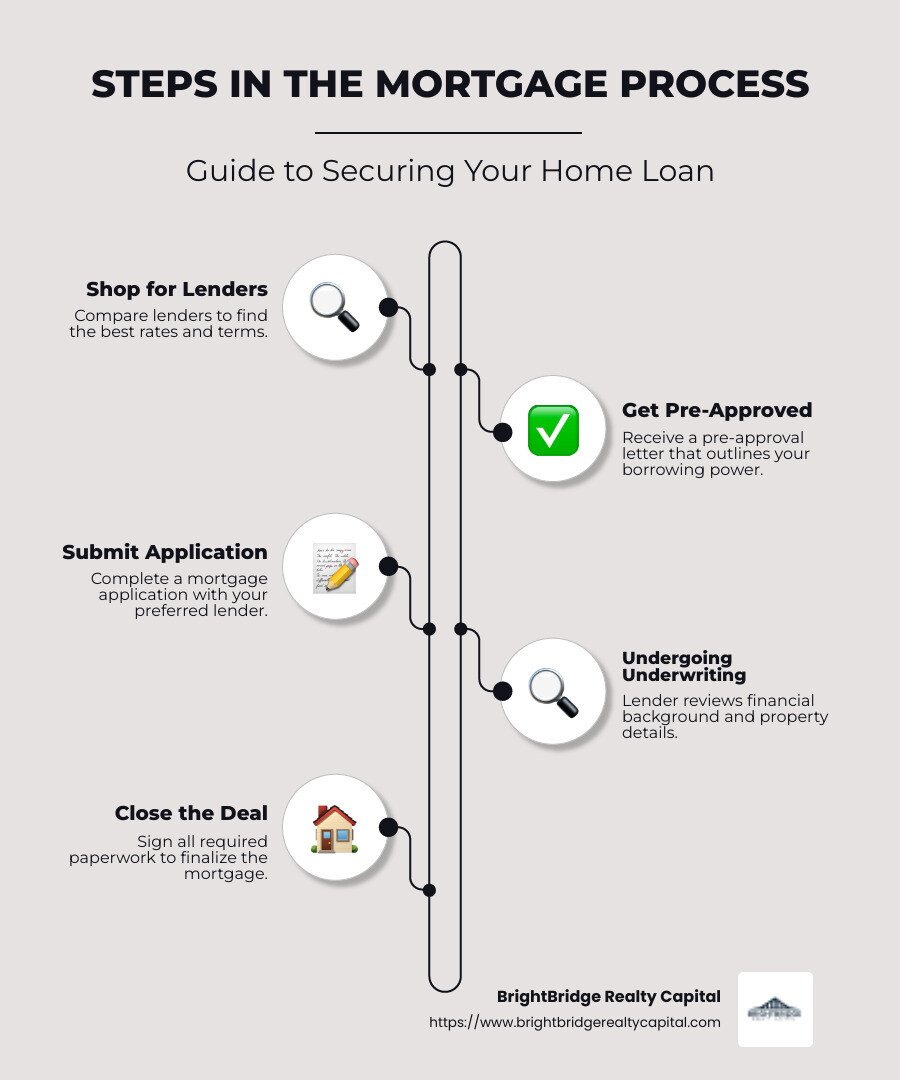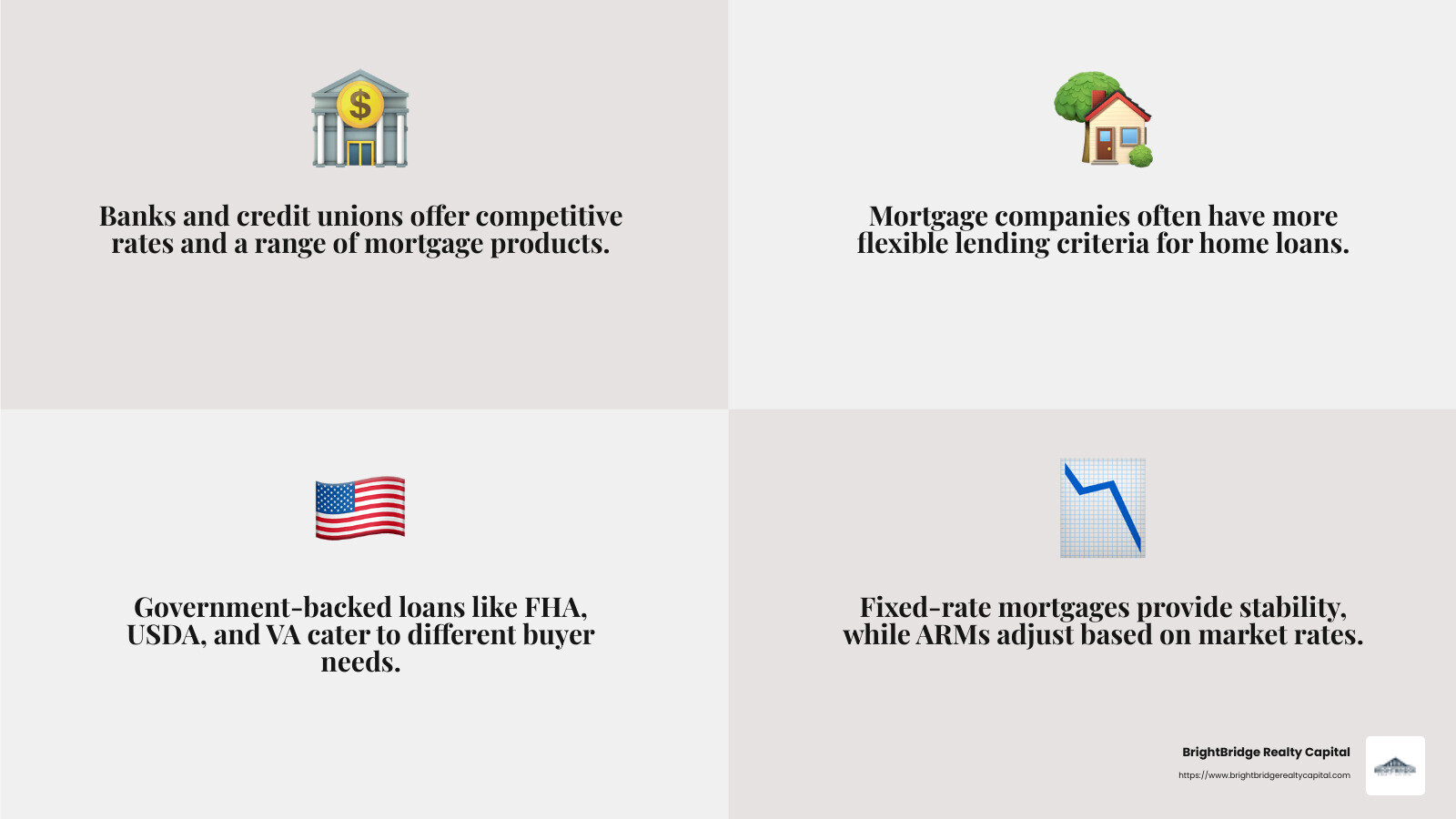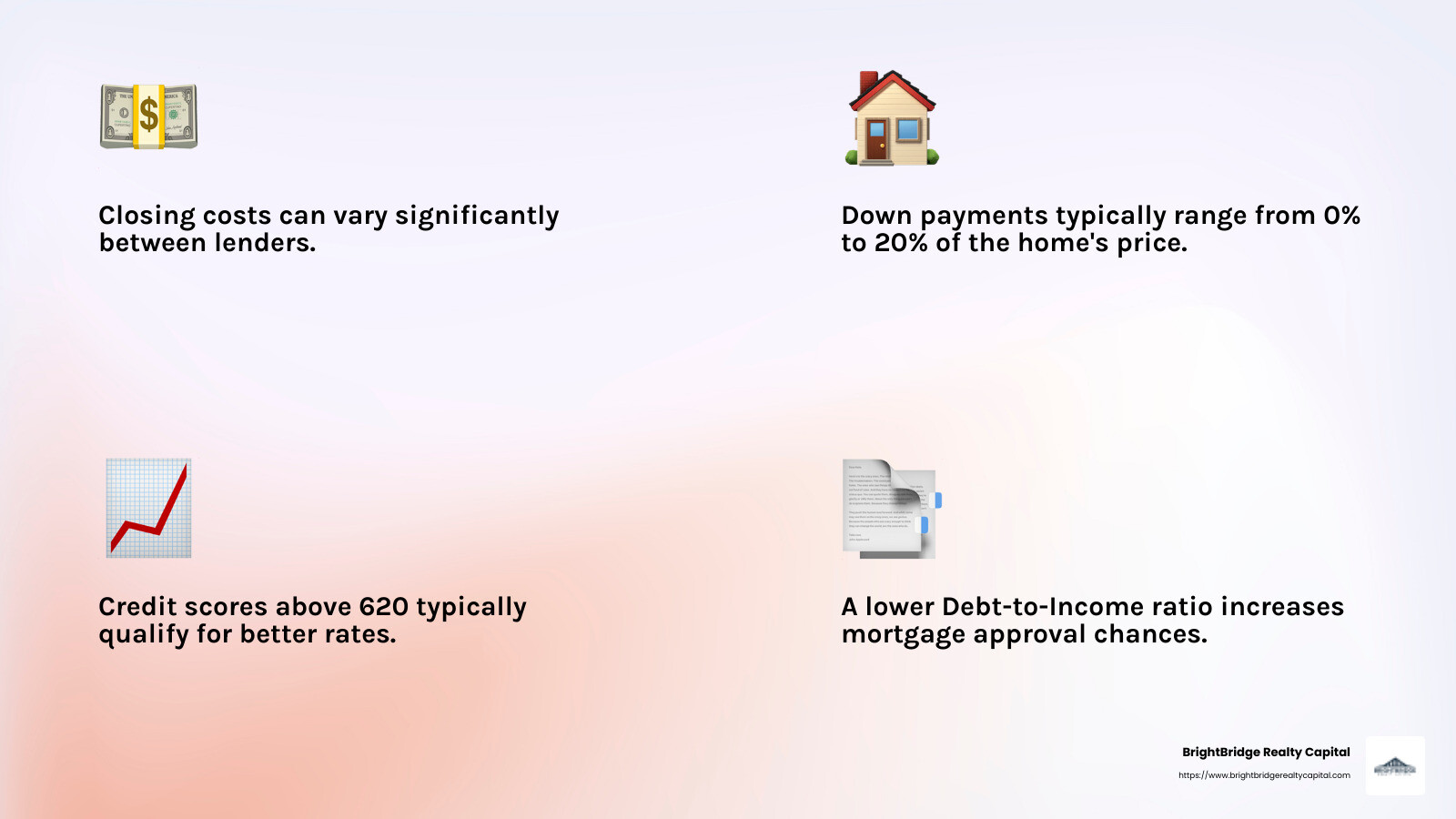Mortgage Lenders Unveiled: Your Guide to the Best in Real Estate

Real estate mortgage lenders play a crucial role in changing the dream of owning a home into reality. Whether you're buying your first home, refinancing an existing mortgage, or investing in rental properties, lenders provide the essential financing solutions you need. To quickly understand the basics:
- Mortgage Process: Begins with shopping for lenders, getting pre-approved, applying for a loan, and finally closing the deal.
- Homebuying: Involves selecting the right property and securing the best mortgage terms to fit your financial situation.
- Refinancing: Offers a strategic way to lower interest rates, reduce monthly payments, or access home equity for other financial goals.
In simple terms, finding the right lender can determine how smoothly your mortgage journey progresses. With various options like fixed-rate and adjustable-rate mortgages, choosing wisely impacts your financial future.

Real estate mortgage lenders terms to know:
Understanding Real Estate Mortgage Lenders
Mortgage lenders are essential players in the real estate market. They provide the funds that make buying a home possible. But not all lenders or loans are the same, so it's important to know your options.
Types of Mortgage Lenders
Banks and Credit Unions: Traditional sources for mortgages, often offering competitive rates and a range of loan products.
Mortgage Companies: Specialize in home loans and often have more flexible lending criteria.
Government Agencies: Offer loans backed by the government, like FHA, USDA, and VA loans, which can be easier to qualify for if you have a lower credit score.
Loan Types
Fixed-Rate Mortgages: These loans have an interest rate that stays the same for the entire term, providing stability in monthly payments.
Adjustable-Rate Mortgages (ARMs): Start with a fixed rate for a period, then adjust based on market rates. This can be beneficial if you plan to sell or refinance before the rate changes.
Government-Backed Loans: FHA loans require a lower down payment and credit score. USDA loans cater to rural buyers with no down payment. VA loans are for veterans and military personnel, also requiring no down payment.
Conventional Loans: Not backed by the government, these loans often require a higher credit score and a larger down payment, especially if you want to avoid private mortgage insurance (PMI).
Financing Options
Home Equity Loans and Lines of Credit: For homeowners looking to tap into their home’s value without refinancing, these options provide either a lump sum or a credit line.
Bridge Loans: Short-term loans that help buyers purchase a new home before selling their current one, ideal for those who need immediate cash flow.

Each lender and loan type has its own set of terms, fees, and eligibility requirements. It's crucial to compare these elements to find the best fit for your financial situation.
Understanding these basics will empower you to make informed decisions and choose the right real estate mortgage lender for your needs.
BrightBridge Realty Capital: Leading the Way in Mortgage Lending
When it comes to real estate mortgage lenders, BrightBridge Realty Capital stands out with its competitive rates and versatile home loan options. Whether you're flipping properties, constructing new homes, or expanding a rental portfolio, BrightBridge offers custom solutions to meet diverse investment needs.
Competitive Rates
BrightBridge Realty Capital takes pride in offering some of the most competitive rates in the industry. As a direct private lender, they eliminate the middleman, providing rates that are hard to beat. This direct approach not only speeds up the process but also ensures you get the best deal possible.
Home Loan Options
BrightBridge offers a wide range of home loan options:
Fix-and-Flip Loans: Perfect for investors looking to renovate and sell properties quickly.
Ground-Up Construction Loans: Ideal for those starting from scratch, providing the capital needed to bring new projects to life.
Rental Loans: Designed for investors aiming to build long-term wealth through rental properties.
Bridge Loans: These short-term loans are perfect for those who need quick liquidity to seize new opportunities before selling an existing property.
Lender Selection
Choosing the right lender is crucial, and BrightBridge makes this decision easy with its streamlined process. From the initial application to the final payoff, their in-house team manages every detail. This ensures a seamless experience, allowing you to focus on your investment strategy without unnecessary delays.
BrightBridge's commitment to fast closings, often within a week, sets them apart in a crowded market. Their ability to quickly pre-authorize and lock in rates means you can move forward with confidence, knowing you have the financial backing you need.
Understanding the landscape of real estate mortgage lenders is key to making informed decisions. BrightBridge Realty Capital not only provides competitive rates and diverse loan options but also simplifies the process, making them a leader in the field.
How to Choose the Right Mortgage Lender
Choosing the right mortgage lender is a critical step in your real estate journey. It can make the difference between a seamless process and a stressful one. Here’s how to steer this important decision:
Preferred Lender
A preferred lender is often a lender recommended by your real estate agent or builder. These lenders are usually familiar with the local market and have a track record of closing deals efficiently. While working with a preferred lender can speed up the process, it’s essential to compare their rates and terms with others to ensure you're getting the best deal.
Regulations
Mortgage lenders are regulated to protect consumers and ensure fair practices. It's important to choose a lender that complies with all federal and state regulations. This includes adhering to the guidelines set by the Consumer Financial Protection Bureau (CFPB), which oversees mortgage practices to prevent fraud and discrimination.
Mortgage Broker
A mortgage broker acts as an intermediary between you and potential lenders. Brokers have access to a wide range of loan products and can help you find a loan that fits your needs. They do the legwork of comparing rates and terms, saving you time and effort. However, be aware that brokers may charge a fee for their services, which can vary.
"A mortgage broker can be invaluable in finding the best rates and terms, especially if you have unique financial circumstances," says a seasoned real estate expert.
Key Considerations
Closing Costs: These are the fees associated with finalizing your mortgage. They can vary greatly between lenders, so compare these costs when evaluating your options.
Down Payment: Different lenders have varying requirements for down payments. Some may offer loans with as little as 3% down, while others might require more.
Eligibility Requirements: Each lender will have specific criteria for credit scores, income, and other financial factors. Ensure you meet these before applying to avoid unnecessary rejections.
By considering these factors, you can find a lender that not only offers competitive rates but also meets your specific needs. The goal is to secure a mortgage that aligns with your financial situation and real estate goals.
Real Estate Mortgage Lenders: Key Considerations
When diving into real estate mortgage lenders, it’s crucial to understand the key factors that can affect your home buying experience. Let’s break down some of these considerations:
Closing Costs
Closing costs are the fees and expenses you pay to finalize your mortgage. They typically range from 2% to 5% of the loan amount. For example, on a $300,000 home loan, you might pay between $6,000 and $15,000 in closing costs. These fees can include:
- Appraisal fees
- Title insurance
- Origination fees
- Credit report charges
It's essential to compare these costs across different lenders, as they can vary significantly. Use tools like a Closing Cost Calculator to get a better estimate of what you might owe.
Down Payment
The down payment is the initial amount you pay towards the purchase of your home. It’s a percentage of the home’s price. Most lenders require a down payment, but the amount can differ:
- Conventional loans often require at least 5% down.
- FHA loans may offer options as low as 3.5% for qualified buyers.
- VA loans might not require any down payment at all for eligible veterans.
State housing finance agencies sometimes provide assistance with down payments, often as a grant or a forgivable loan. This can be a great option for first-time home buyers.
Eligibility Requirements
Each lender has its own set of eligibility criteria. These typically include:
- Credit Score: A higher score can qualify you for better rates. Lenders usually look for scores above 620, but there are options for those with lower scores.
- Income: Lenders will assess your income to ensure you can afford the mortgage payments.
- Debt-to-Income Ratio (DTI): This is the percentage of your income that goes towards debt payments. A lower DTI is preferable.
Before applying, make sure you understand these requirements and prepare the necessary documentation. This can help you avoid unnecessary rejections and streamline the approval process.
By focusing on these key considerations, you can better steer the complex landscape of real estate mortgage lending. This will help you secure a loan that aligns with your financial situation and homeownership goals.

Next, we'll address some frequently asked questions about mortgage lenders to further clarify the process.
Frequently Asked Questions about Real Estate Mortgage Lenders
Understanding real estate mortgage lenders can be daunting, but we're here to simplify it. Here are some common questions and answers to help you make informed decisions.
What is a preferred lender?
A preferred lender is a mortgage lender recommended by real estate agents, builders, or other professionals. These lenders often have a strong track record of providing excellent service and competitive rates. Working with a preferred lender can sometimes offer benefits like streamlined processes or reduced fees, but it's crucial to compare their offers with others to ensure you're getting the best deal.
How are mortgage lenders regulated?
Mortgage lenders are regulated by various federal and state agencies to ensure fair practices and protect consumers. Key regulations include:
- Truth in Lending Act (TILA): Requires lenders to provide clear information about loan terms and costs.
- Real Estate Settlement Procedures Act (RESPA): Protects consumers from abusive practices and ensures transparency in the settlement process.
- Dodd-Frank Act: Established the Consumer Financial Protection Bureau (CFPB) to oversee and enforce regulations on mortgage lenders.
These regulations help maintain fair lending practices and protect you from predatory lending.
What is the difference between a real estate agent and a mortgage broker?
A real estate agent helps you buy, sell, or rent properties. They guide you through the real estate market, negotiate prices, and handle contracts.
A mortgage broker, on the other hand, acts as an intermediary between you and potential lenders. They help you find the best mortgage rates and terms by comparing offers from multiple lenders. While real estate agents focus on the property aspect, mortgage brokers focus on securing the right financing for your purchase.
By understanding these roles, you can better steer the home buying process and make informed decisions about your mortgage.
Conclusion
In real estate mortgage lenders, finding a partner who simplifies the complex and fast-tracks your financing needs is invaluable. At BrightBridge Realty Capital, we pride ourselves on offering a seamless process and fast closings that set us apart from the competition.
Our approach is simple: We offer quick, flexible funding with competitive rates, often closing deals within a week. This speed and efficiency mean you can seize opportunities without delay, keeping your real estate investment strategy on track.
As a direct lender, we eliminate intermediaries, ensuring a straightforward, hassle-free experience. Our commitment to excellence and our deep understanding of the real estate market make us a trusted partner for investors nationwide.
Whether you're flipping properties, building from the ground up, or expanding your rental portfolio, BrightBridge Realty Capital is here to support your journey with custom solutions that fit your unique needs.
Ready to experience a seamless mortgage process? Explore our services and find how we can help you achieve your real estate goals.


